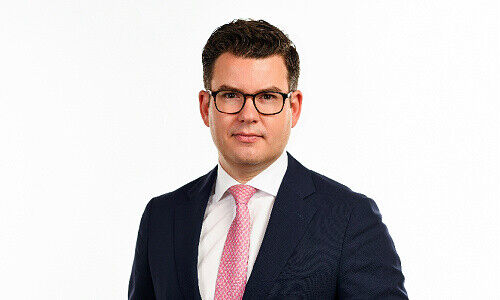The gap between the number of assets managed by funds compared to banks and wealth managers is closing. The CEO of such a fund talked to finews.com about the inroads funds are making in Switzerland.
A recent study from the Swiss National Bank examined the growing importance of investment funds in Switzerland at the expense of traditional banks. To be sure, banks hold a significant lead in terms of the assets they managed, but the funds are making substantial inroads.
Investment funds manage 1.23 trillion francs, about a third of what is under management at banks. From 2005 to 2021, the number of banks declined by 29 percent from 337 entities domiciled in Switzerland to 239. At the same time, the number of investment funds based in the country increased 127 percent to just over 1,800, according to the SNB.
Closing the Gap
Cutting the lead of banks and wealth managers in the managed assets race is not something that will happen overnight. A partnership between BNY Mellon and Newton Investment Management could serve as a template for other firms seeking to expand their fund business in Switzerland. finews.com discussed such trends with Newton Investment Management CEO Euan Munro, and Martin Rees, Country Head Switzerland, BNY Mellon Investment Management

Martin Rees, BNY Mellon Investment Management Country Head Switzerland
«Newton has been an important investment manager for BNY Mellon since we opened the Swiss office 20 years ago. Some of its key strategies have been flagship products for a very long time,» Rees explained.
Newton has seen strong interest in thematic and sustainable investment strategies from Swiss-domiciled investors and advisors and Rees expects this to continue. Over the next five years, investors will need to generate real income in a higher interest rate, the more inflationary, and less geopolitically stable world he said of the outlook.
Active Vs. Passive
In an environment of easy money from central banks, passive investment approaches have benefitted by offering good returns with very low fees. But that has changed according to Munro. «It appears likely to us that we are now in a period where the overall market will not reliably deliver returns.» This offers very good opportunities for firms «offering highly active portfolios, with the ability to carry out in-depth research into individual securities and access idiosyncratic ideas,» he said.
Still, there is one development that might keep investors from moving from passive funds into managed ones with their higher fees. Munro said that there is probably enough policy tightening in the markets currently. He thinks that higher rates will be maintained for longer than expected, with the danger that «too many people expect interest rates to decline again quite quickly.»
Many investors may be hoping that their current portfolio will lead them out of the downturn, but while history may not repeat itself, a look back at previous cycles suggests that market leadership can change dramatically in such instances. Internet and telecoms stocks, for example, formed the dot-com bubble in late 1999 but did not lead the recovery when the market finally found its bottom in 2003, he said.
Alternative investments have come into their own, and are also an area funds can pursue, Munro said. Newton's dedicated private markets team also has the advantage that it allows investors to draw insights from the private realm into other areas of their portfolios.
From Cash Into Funds
Cash lying in banks is another area funds can target and attract more investment.
«Some of the competition between bank deposits and investment funds has not been helpful in our view as it has created confusion between savings and investments,» Munro said. Savings are expected to be capital secure and very low risk, while investments should be long-term, with greater reward, and ought to maintain real wealth, something that bank deposits fail to do.»
In recent years there has been a shift from cash deposits into bond funds albeit in 2022 as interest rates have risen it has damaged the return of many bond funds and made bank cash deposits more attractive, Munro said.
Engaged Sustainable Investing
There is increasing talk about sustainable investments and how companies can make both money and a difference. For some firms, that means not having carbon-intensive investments in their portfolios. For others, it means taking an active role in companies in which they invest. Newton falls into the latter camp.
«For some, being sustainable means taking the most carbon-intensive stocks out of your portfolio and declaring that the world should look like your portfolio. We don’t think that is realistic,» Munro said.
Munro believes it is necessary to engage with companies and convince them to subscribe to science-based goals to achieve net zero. Paradoxically, building an infrastructure to achieve a cleaner future could mean «a significant carbon footprint in the short term with the benefits coming later,» he said. But it also presents an opportunity.
«There are myriad new investment opportunities aligned with delivering a successful energy transition. We have already made investments in several solution providers linked to the transition to a lower-carbon economy on behalf of our clients,» he added.
For Munro, this is where its partnership with BNY Mellon Investment Management benefits Newton, allowing the funds house to «enjoy genuine international distribution channels, operational infrastructure, local market expertise, as well as global influence.»
A Long-Term Approach
In Rees' view, what has made Switzerland attractive for investment is that it has been an adopter of both thematic and sustainable strategies. «We do share some great long-term business relationships here and we are working to further strengthen them,» he said. Both individual and institutional investors are sought after, and Rees said some strategies resonate better with one type of investor than the other.
But overall, «Swiss investors are very sophisticated and can be demanding,» and want a good range of investment options, he said. Such a commitment to long-term investing is what could be the driving force if funds want to continue to close the gap to wealth managers in Switzerland.




































